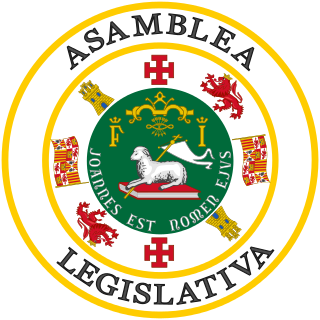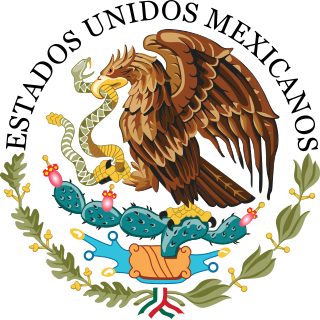
The politics of Brazil take place in a framework of a federal presidential representative democratic republic, whereby the President is both head of state and head of government, and of a multi-party system. The political and administrative organization of Brazil comprises the federal government, the 26 states and a federal district, and the municipalities.

The President of Brazil, officially the President of the Federative Republic of Brazil or simply the President of the Republic, is both the head of state and the head of government of Brazil. The president leads the executive branch of the federal government and is the commander-in-chief of the Brazilian Armed Forces. The presidential system was established in 1889, upon the proclamation of the republic in a military coup d'état against Emperor Pedro II. Since then, Brazil has had six constitutions, three dictatorships, and three democratic periods. During the democratic periods, voting has always been compulsory. The Constitution of Brazil, along with several constitutional amendments, establishes the requirements, powers, and responsibilities of the president, their term of office and the method of election.

The Constitution of the Republic of Croatia is promulgated by the Croatian Parliament.

The Florida Legislature is the Legislature of the U.S. State of Florida. It is organized as a bicameral body composed of an upper chamber, the Senate, and a lower chamber, the House of Representatives. Article III, Section 1 of the Florida Constitution, adopted in 1968, defines the role of the Legislature and how it is to be constituted. The Legislature is composed of 160 State Legislators. The primary purpose of the Legislature is to enact new laws and amend or repeal existing laws. The Legislature meets in the Florida State Capitol building in Tallahassee.
The Constitution of South Africa is the supreme law of the Republic of South Africa. It provides the legal foundation for the existence of the republic, sets out the rights and duties of its citizens, and defines the structure of the government. The current constitution, the country's fifth, was drawn up by the Parliament elected in 1994 in the South African general election, 1994. It was promulgated by President Nelson Mandela on 18 December 1996 and came into effect on 4 February 1997, replacing the Interim Constitution of 1993.

The National Assembly is the de jure legislature for Venezuela that was first elected in 2000. The National Assembly has been rendered ceremonial since the introduction of the Constituent Assembly in 2017. It is a unicameral body made up of a variable number of members, who were elected by a "universal, direct, personal, and secret" vote partly by direct election in state-based voting districts, and partly on a state-based party-list proportional representation system. The number of seats is constant, each state and the Capital district elected three representatives plus the result of dividing the state population by 1.1% of the total population of the country. Three seats are reserved for representatives of Venezuela's indigenous peoples and elected separately by all citizens, not just those with indigenous backgrounds. For the 2010-2015 period the number of seats was 165. All deputies serve five-year terms. The National Assembly meets in the Federal Legislative Palace in Venezuela's capital, Caracas.

The Congress of the Republic of Colombia is the name given to Colombia's bicameral national legislature.

The Florida House of Representatives is the lower house of the Florida Legislature, the state legislature of the U.S. state of Florida, the Florida Senate being the upper house. Article III, Section 1 of the Constitution of Florida, adopted in 1968, defines the role of the Legislature and how it is to be constituted. The House is composed of 120 members, each elected from a single-member district with a population of approximately 157,000 residents. Legislative districts are drawn on the basis of population figures, provided by the federal decennial census. Senators' terms begin immediately, upon their election. As of 2019, Republicans hold the majority in the State House with 71 seats; Democrats are in the minority with 46 seats. Three seats are vacant due to resignations.

The Legislative Assembly of Puerto Rico is the territorial legislature of the Commonwealth of Puerto Rico, responsible for the legislative branch of the government of Puerto Rico. The Assembly is a bicameral legislature consisting of an upper house, the Senate normally composed by 27 senators, and the lower house, the House of Representatives normally composed by 51 representatives. Eleven members of each house are elected at-large rather than from a specific legislative district with all members being elected for a four-year term without term limits.

During its independent political history, Brazil has had seven constitutions. The most recent was ratified on October 5, 1988.

The Florida Senate is the upper house of the Florida Legislature, the state legislature of the U.S. state of Florida, the Florida House of Representatives being the lower house. Article III, Section 1 of the Constitution of Florida, adopted in 1968, defines the role of the Legislature and how it is to be constituted. The Senate is composed of 40 members, each elected from a single-member district with a population of approximately 470,000 residents. Legislative districts are drawn on the basis of population figures, provided by the federal decennial census. Senators' terms begin immediately, upon their election. The Senate Chamber is located in the State Capitol building.
The Constitution of the Maldives is the supreme law of the country of Maldives. It provides the legal foundation for the existence of the Republic of Maldives, sets out the rights and duties of the citizens of Maldives, and defines the structure of the Government of the Maldives. The current Constitution of Maldives was ratified by President Maumoon Abdul Gayyoom on 7 August 2008, and came into effect immediately, replacing and repealing the Constitution of 1998.

The Parliament of Albania or Kuvendi is the unicameral representative body of the citizens of the Republic of Albania; it is Albania's legislature. The Parliament is composed of not less than 140 members elected to a four-year term on the basis of direct, universal, periodic and equal suffrage by secret ballot. The Parliament is presided over by a Speaker of the Parliament, who is assisted by at least one deputy speaker. The electoral system is based on party-list proportional representation. There are 12 multi-seat constituencies, corresponding to the country's administrative divisions.

The House of Representatives is the lower house of the National Assembly of Thailand, the legislative branch of the Thai government. The system of government of Thailand is that of a constitutional monarchy and a parliamentary democracy. The system of the Thai legislative branch is modelled after the Westminster system. The House of Representatives has 500 members, all of which are democratically elected: 375 members were directly elected through single constituency elections, while the other 125 are elected through party-list proportional representation. The roles and powers of the House of Representatives were enshrined in the Constitution of 2017.

The Consultative Assembly is the lower house of the Council of Oman. It is the only legislative body in Oman of which all members are democratically elected. The other chamber of the parliament is the Council of State.

The Constitution of Cameroon is the supreme law of the Republic of Cameroon. Adopted in 1972, it is Cameroon's third constitution. The document consists of a preamble and 13 Parts, each divided into Articles. The Constitution outlines the rights guaranteed to Cameroonian citizens, the symbols and official institutions of the country, the structure and functions of government, the procedure by which the Constitution may be amended, and the process by which the provisions of the Constitution are to be implemented.

The Constitution of Azerbaijan was adopted on 12 November 1995 by popular referendum. This Constitution was the first Constitution of independent Azerbaijan, the Azerbaijan Democratic Republic founded in 1918 and existed 23 months until 1920 was not able to adopt its constitution. Therefore, the history of Constitution building in Azerbaijan generally starts from the period of Azerbaijan being part of Soviet Union. The first Constitution of Azerbaijan SSR was adopted in 1921 and was in accordance with the Constitution of USSR. The last Constitution of Azerbaijan SSR was adopted on 21 April 1978 and also was in line and form of USSR Constitution. The first Constitution of independent Azerbaijan consists of 5 chapters, 12 sections and 147 articles. It was amended on 24 August 2002 and again on 18 March 2009. It carries the "highest legal force" in Azerbaijan as per article 147. The most recent amendments to the Constitution were approved after the Constitutional referendum held on 26 September 2016. In 2002, 31 amendments were made to 22 articles; in 2009, 41 amendments were made to 29 articles; and in 2016, 23 articles were amended and new 6 new articles were added.

The present Constitution of Botswana commenced on September 30, 1966.

The United States House of Representatives is the lower chamber of the United States Congress, the Senate being the upper chamber. Together they comprise the legislature of the United States.

The Federal government of Mexico is the national government of the United Mexican States, the central government established by its constitution to share sovereignty over the republic with the governments of the 31 individual Mexican states, and to represent such governments before international bodies such as the United Nations. The Mexican federal government has three branches: executive, legislative, and judicial and functions per the Constitution of the United Mexican States, as enacted in 1917, and as amended.





















